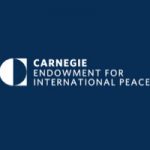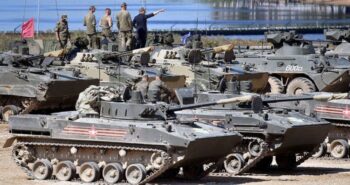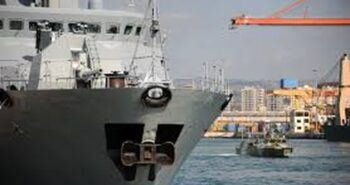By Frederic Wehrey
 Putin has dispatched mercenaries to Libya’s civil war, exploiting the protracted conflict to carve out a new sphere of influence in North Africa.
Putin has dispatched mercenaries to Libya’s civil war, exploiting the protracted conflict to carve out a new sphere of influence in North Africa.
It was the mortar rounds that worried Muhammad the most. They fell with a frequency he’d never encountered. “Like rain,” he said.
Then there were the snipers. Their shots were terrifyingly accurate and used a type of bullet new to the Libyan battlefield.
It was an overcast evening in November 2019. I sat with Muhammad, a militia commander and former engineer in his late forties, in a farmhouse outside the Libyan capital of Tripoli.
For months, he and his men had been waging a grinding war against forces led by a renegade general named Khalifa Haftar, who was trying to topple the country’s internationally recognized government.
It had been a static battle whose frontlines barely moved. But in September, Haftar had gained momentum. His firepower became more lethal. His emboldened men seized new territory.
The sudden shift was the handiwork of hundreds of Russian mercenaries from the Wagner Group who had arrived to bolster Haftar’s troops.
An ostensibly private military company, Wagner has, in fact, served as an important tool of power projection for Russian President Vladimir Putin. It has been deployed across the globe, from the Central African Republic and Mozambique to Syria and Ukraine.
The results of these adventures have been mixed. In Libya, however, the Wagner Group made a difference. Morale among the government forces plummeted. Capturing Tripoli appeared within Haftar’s grasp.
This wasn’t the first time that Russia had helped Haftar. Drawn by the promise of energy control and arms deals in this oil-rich state, Moscow had courted and aided the Libyan general for years. All the while, it kept open channels to his government rivals.
To counter the Wagner deployment last fall, the Libyan government turned to Turkey for help. In December, Ankara deployed thousands of Syrian mercenaries to Tripoli—along with advisers, air defenses, artillery, and drones. Aided by this influx, government troops pushed Haftar’s forces out of the capital region.
Moscow quickly pivoted, dispatching advanced combat jets to Haftar’s territory in the east. In tandem, Wagner forces were redeployed across the east and south, including to strategic oil fields.
These moves were part of a broader Russian strategy to gain leverage for a political settlement with Turkey that would establish economic and military spheres of influence while undercutting Europe and the United States. And they starkly illustrated how an opportunistic and scalable military intervention could yield modest strategic gains for Russia.
But the Libyan conflict has carried incalculable human costs. Haftar’s forces are responsible for indiscriminate attacks on civilians, according to the United Nations.
Meanwhile, Western powers have largely stayed on the sidelines. The U.S. President Donald Trump’s administration has tacitly endorsed the Libyan general’s assault.
Washington is growing frustrated with Haftar’s blockade of oil facilities and alliance with Russia, yet the White House continues to downplay the destructive role of U.S. allies—including Egypt, France, and the United Arab Emirates—in fueling his campaign.
France has admonished Turkey for intervening while ignoring the Emirates’ longstanding interference, but Europe as a whole has been too divided and distracted to engage.
For Muhammad, the progovernment Libyan commander, U.S. ambivalence has been especially bitter.
Several years ago, he and the Tripoli government forces received U.S. military aid during a campaign against the self-proclaimed Islamic State. Now they feel abandoned.
“Russia gave Haftar mortars,” he said. “What did Trump give us?”
***
Frederic Wehrey is a senior fellow in the Middle East Program at the Carnegie Endowment for International Peace. His research deals with armed conflict, security sectors, and identity politics, with a focus on Libya, North Africa, and the Gulf.

********
RUSSIA BREACHED ARMS EMBARGO IN LIBYA WITH 338 CARGO FLIGHTS
By Steve Balestrieri
 “If there are Russians in Libya, they are not representing or paid by the Russian government,” Russian President Vladimir Putin said in January.
“If there are Russians in Libya, they are not representing or paid by the Russian government,” Russian President Vladimir Putin said in January.
In reality, the total number of Russians (paid for, trained, and transported by the Russian government) in Libya as part of the Wagner Group is unknown but rumored to be around 1,500.
They remain active and are beefing up their numbers around Libyan oil fields under the control of General Khalifa Haftar’s Libyan National Army (LNA) in direct violation of the UN embargo.
In a confidential May report, sanction monitors for Libya said that the Wagner Group had up to 1,200 people deployed in the country. That was before Wagner increased its numbers and seized the aforementioned oil fields and production facilities.
Between Wagner and other recruited militias Russian proxy mercenaries now number close to 5,000 troops, according to U.S. estimates.
Wagner Group troops have seized control of Es-Sider, Libya’s largest oil depot, which contains two of Libya’s biggest oil facilities. It is the country’s most important port for oil exports.
In April, Wagner was accused by Libya’s Interior Minister, Fathi Bashagha, of carrying out a chemical attack in the country. Bashagha said the Russian mercenaries used a nerve agent against GNA forces in Salah Al-Din area in southern Tripoli.
US Africa Command (AFRICOM) accused Wagner of sowing the areas that they withdrew from with landmines and booby traps that have killed 61 and wounded 113 people. The Russians have scoffed at these reports as “crazy talk.”
AFRICOM continues to show that the Russian Federation continues to violate U.N. Security Council Resolution UNSCR 1970 by continuing to provide military equipment and troops to the front lines of the conflict in Libya.
AFRICOM released several satellite images, which clearly show that Russia supplied Wagner forces operating in Libya with fighter aircraft, military armored vehicles, air defense systems, and supplies.
The U.S. tracked 14 SU-24 attack aircraft and MiG-29 fighters that flew from Russia to Syria and then to Libya. Their Russian markings were painted over to conceal their identity.
“Imagery reflects the broad scope of Russian involvement,” said Army Brig. Gen. Gregory Hadfield, AFRICOM deputy director of intelligence. “They continue to look to attempt to gain a foothold in Libya.”
The Russians are also carrying out cargo flights. According to a report given to the United Nations from independent sanctions monitors, from November 2019 through July 31, Russia conducted 338 cargo flights. These supplied General Haftar’s forces in direct contradiction of the U.N. sanctions. The cargo flights were departing mainly from the Hmeimim airbase in Syria.
In a transparent effort to conceal their identities, these cargo aircraft turned off their aircraft transponders when entering Egyptian or Libyan airspace. Transponders allow the aircraft to be tracked. However, they are still easily traced.
Yet, Russia isn’t the only country that has been violating the U.N. arms embargo. The report stated that besides Russia, Turkey, the United Arab Emirates, Jordan, and Qatar have also breached the arms embargo on Libya.
The independent report blasted the above countries for either conducting or allowing breaches of the arms embargo to continue.
The Russians flaunted the embargo and stepped up their support beginning early this year.
The U.N. report stated, “that direct Russian Federation military logistic support to ChVK Wagner, and possibly the other Russian Federation based private military companies… significantly increased from January 2020 to June 2020.”
“Since the more direct engagement by Turkey in December 2019 and the United Arab Emirates in January 2020, arms transfers to Libya by those two member states have been extensive, blatant, and with complete disregard to the sanctions measures,” the report stated.
It added that the other nations listed aided in the breaching of the U.N. sanctions by not inspecting “cargo of suspicious commercial vessels or aircraft destined for Libya for which there were reasonable grounds.”
In a surprise to no one, the U.N. report stated that “The arms embargo remains totally ineffective.”
Libya descended into chaos and civil war in 2011 after the ousting and killing of longtime dictator Col. Muammar al-Qaddafi. Since then, the country has been divided between factions vying for power: Haftar’s faction in the east and the internationally recognized Government of National Accord (GNA) in the west. Each is backed by rival foreign powers.
***
Steve Balestrieri served as a Special Forces NCO and Warrant Officer before injuries forced his early separation. He writes for SOFREP and covers the NFL for PatsFans.com and his work is regularly featured in the Millbury-Sutton Chronicle and Grafton News newspapers
__________





